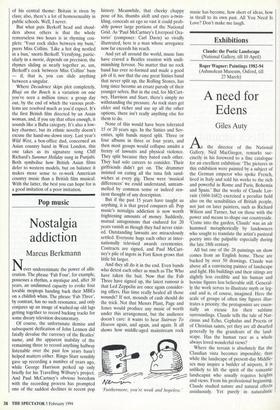Pop music
Nostalgia addiction
Marcus Berkmann
Never underestimate the power of allit- eration. The phrase 'Fab Four', for example, possesses a rhythm, a mystique and, after 30 years, an undimmed capacity to evoke four lovable moptops handing back their MBEs , on a childish whim. The phrase 'Fab Three', by contrast, has no such resonance, and only conjures up an image of washed-up old lags getting together to record backing tracks for some dreary television documentary.
Of course, the unfortunate demise and subsequent deification of John Lennon did fatally devalue the currency of the Beatles' name, and the apparent inability of the remaining three to record anything halfway listenable over the past few years hasn't helped matters either. Ringo Starr sensibly gave up recording a number of years ago, while George Harrison perked up only briefly for his Travelling Wilbury's project. And Paul McCartney's obvious boredom with the recording process has prompted one of the saddest declines in recent pop history. Meanwhile, that cheeky chappy pose of his, thumbs aloft and eyes a-twin- kling, conceals an ego so vast it could prob- ably power large portions of the National Grid. As 'Paul McCartney's Liverpool Ora- torio' (composer: Carl Davis) so vividly illustrated, here is a man whose arrogance now far exceeds his reach.
And yet all around the world, music fans have craved a Beatles reunion with undi- minishing fervour. No matter that no rock band has ever re-formed and made a good job of it, nor that the one great Sixties band that never split up, the Rolling Stones, has long since become an ersatz parody of their younger selves. But in the end, for McCart- ney, Harrison and Starr, there's simply no withstanding the pressure. As rock stars get older and richer and use up all the other options, there isn't really anything else for them to do.
None of this would have been tolerated 15 or 20 years ago. In the Sixties and Sev- enties, split bands stayed split. Three or four albums in three or four years, and then most groups would collapse amidst a frenzy of lawsuits and physical violence. They split because they hated each other. They had solo careers to consider. Their girlfriends didn't get on. The drummer insisted on eating all the tuna fish sand- wiches at every gig. These were 'musical differences' we could understand, untram- melled by common sense or indeed sen- tient thought of any description.
But if the past 15 years have taught us anything, it is that greed conquers all. Pop music's nostalgia addiction is now worth frightening amounts of money. Suddenly, mutual antagonisms that endured for 20 years vanish as though they had never exist- ed. Outstanding lawsuits are miraculously settled. Everyone hugs each other at inter- nationally televised awards ceremonies. Contracts are signed, and Paul McCart- ney's pile of ingots in Fort Knox grows that little bit larger.
And they all do it in the end. Even bands who detest each other as much as The Who have taken the bait. Now that the Fab Three have signed up, the latest rumour is that Led Zeppelin are once again consider- ing offers. Has time really healed all those wounds? If not, mounds of cash should do the trick. Not that Messrs Plant, Page and Jones would produce any music of worth under this arrangement, but the audience doesn't care: it wants to hear Stairway To Heaven again, and again, and again. It all shows how middle-aged mainstream rock
'Furthermore, you're weak and hopeless.' music has become, how short of ideas, how in thrall to its own past. All You Need Is Love? Don't make me laugh.


















































 Previous page
Previous page